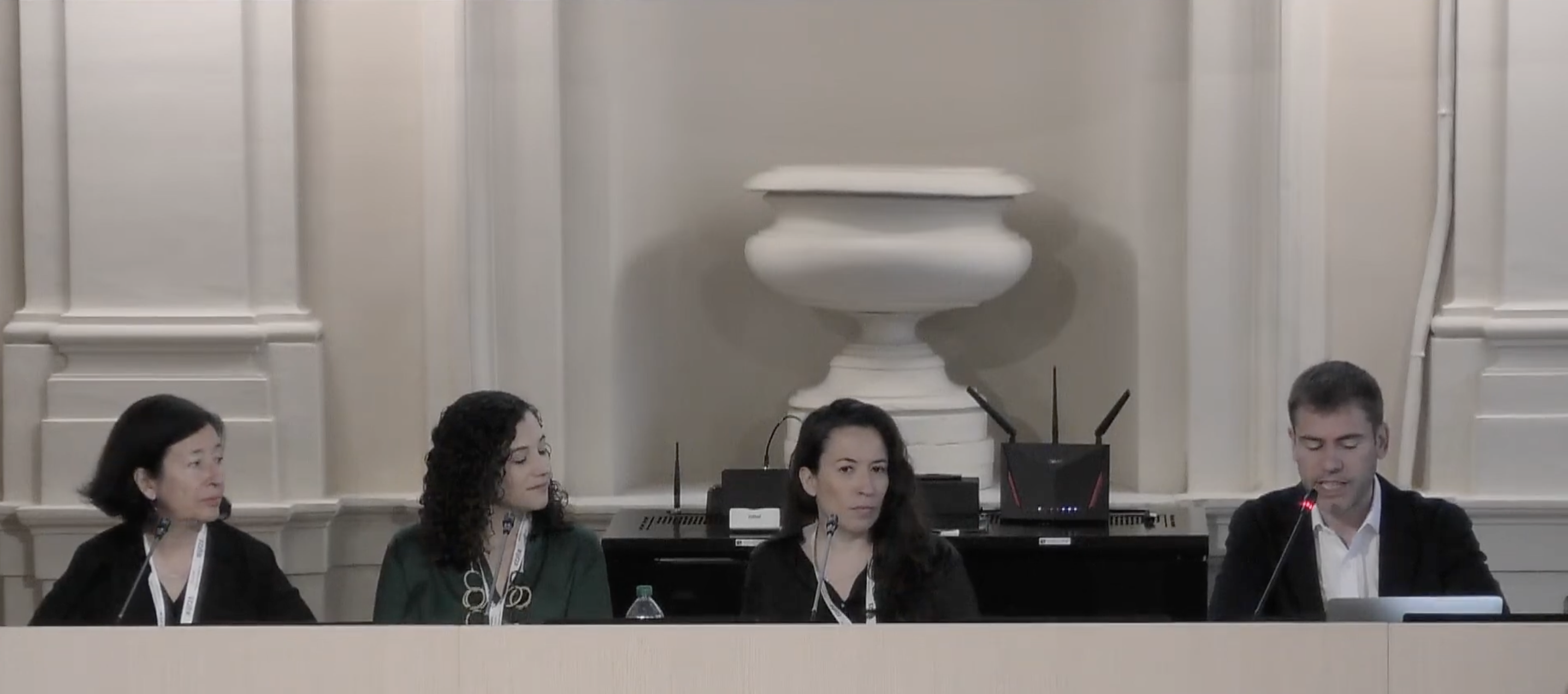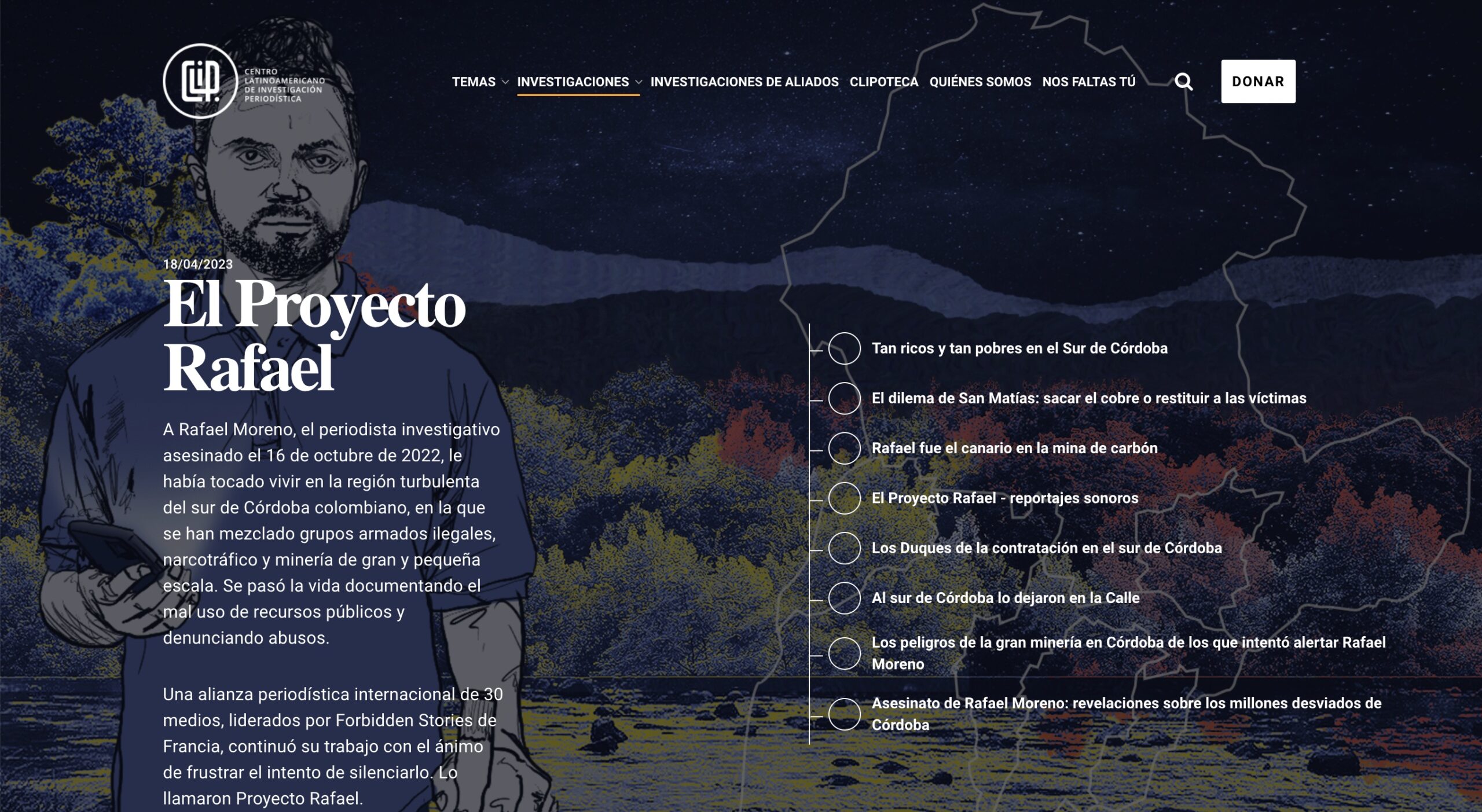Latin America is a complex region where social phenomena are happening that deserve international attention, such as the strengthening of authoritarianism, human rights violations and growing violence.
But if international media seek to cover this region, they must approach it with the awareness that it is a diverse area, identify patterns in common among the different countries, find points of connection with the realities of other regions, and approach and collaborate with local journalists.
Those were some of the recommendations given to international journalists by María Teresa Ronderos, director of the Latin American Center for Investigative Journalism - CLIP (Colombia); Silvia Viñas, host and executive producer of the podcast "El Hilo," from Radio Ambulante; and Alejandra Sánchez Inzunza, co-founder and director of Dromómanos (Mexico), during the panel "Latin America: How to cover a region that is always in crisis," which was held as part of the International Journalism Festival 2023, in Perugia, Italy.
The panel, which took place on Saturday, April 22, 2023 and was promoted by Radio Ambulante, was moderated by Eduardo Suárez, editorial director of The Reuters Institute for the Study of Journalism. “Latin America is a very important region in terms of journalism, and in terms of how journalism is consumed. It is quite special in the sense that it is a very young continent, so [there are] a lot of young audiences, and also news is usually consumed through mobile phones and through social networks. And that introduces some challenges for us as journalists,” Suárez said at the beginning of the panel.

María Teresa Ronderos, Silvia Viñas and Alejandra Sánchez Inzunza participated in the panel "Latin America: How to cover a region that is always in crisis", moderated by journalist Eduardo Suarez. (Photo: Screenshot from YouTube)
Although Latin America is a diverse region with great differences between countries, there are also structural patterns and problems that affect the entire region. There are also international actors that impact the Latin American reality. To better cover the region from the outside, it is important for journalists to identify these patterns and factors, Ronderos recommended.
“I think we have to identify these actors, identify these structural problems and see what's common in all this region, because it's the only way we can start to address it,” Ronderos said. “Sometimes problems cannot be solved inside the country but precisely because there are too many international influences, so if you actually see them and make them visible, then it becomes easier to understand the problems.”
An effective way to identify regional issues is to listen to Latin American journalists themselves and to approach organizations that do cross-border journalism in the region with a Latin American point of view. While international journalists can sometimes see things that are difficult to perceive from the inside, a balance between the two points of view can help achieve better coverage, Ronderos said.
“Sometimes it's difficult for international media to cover Latin America because we all have a view of things from the outside,” Ronderos said. “And I think it's very interesting for example sometimes to read El País América, because El País América is a mixture of seeing Latin America from the outside but at the same time covered by Latin Americans, so it's like you have the best of both worlds.”
Sánchez Inzunza agreed that reaching out to local journalists is an effective way to cover Latin America. She recommended her colleagues from other continents to collaborate with independent Latin American journalists, but not only using their services as fixers, but to learn professionally from them and help them get their work published in international media.
She said that Dromómanos, a production company for journalistic projects specialized in regional projects and long-form stories, is currently working in alliance with independent media and local journalists from several Latin American countries on coverage of issues that the organization believes are seriously affecting the region, such as authoritarianism, climate change, violence, and drug policies. The objective, she said, is to give a regional and international point of view to such coverage.
“Freelance journalists helped us a lot to understand better the problems, to not only repeat what is happening, but also to learn a lot from our colleagues, from local journalists that are at risk because we [Latin America] are one of the most dangerous regions in the world for being journalist,” Sánchez said. “I learned from El Salvador things from Carlos Dada, I learned from Colombia things with María Teresa [Ronderos]. And that is super important.”
Viñas also talked about the risks faced by local journalists. She said that international reporters should be careful not to put their Latin American colleagues at greater risk when collaborating with them in coverage involving violence or drug trafficking.
She said that they should be aware that by revealing cases on these topics, local journalists may be exposed and at risk of reprisals once the coverage is published.
“We need to be very careful of what we ask local journalists to do, because [...] we leave and they stay, and they have given us their sources, they have taken us to places, but it's their neighbors who we are exposing, such as drug dealers,” Viñas said. “We have to be very careful and not to try to go to Latin America, look like a hero because we're covering this, and then go back to our comfortable homes in Europe, while the local journalist is left there with the dangers.”
El colapso del sistema de salud en Guayaquil, Ecuador, es una alerta para el resto de ciudades en Latinoamérica. ¿Cómo se llegó a ese punto? Escuchen la historia en el episodio más reciente de @elhilopodcast. https://t.co/kz2AWBd3M5 pic.twitter.com/dlMVYJMxc6
— Radio Ambulante (@radioambulante) April 13, 2020
Ronderos mentioned some of CLIP's projects that have explored phenomena that cut across several Latin American countries. One of them is the investigation “Una guerra adictiva [An Addictive War],” carried out by CLIP in alliance with Dromómanos and nine other news outlets. In this cross-border report, journalists from six Latin American countries investigated the footprint left by the fight against drugs in the region over the past 50 years.
Another example is “El Negocio de la Represión [The Business of Repression],” an investigation that covered stories of victims of non-lethal weapons used in acts of repression of recent protests in Latin America.
Ronderos also mentioned the feature story "The Rafael Project," in which an international alliance of 30 news outlets, led by the French organization Forbidden Stories, undertook the task of continuing the work of Colombian journalist Rafael Moreno, who was murdered in October 2022, on the misuse of public resources and abuses in the city of Córdoba, Colombia.
“I think that, when you are covering a region and you are doing transnational journalism, you have to work with other people that are doing the same thing, so you don't compete anymore. Now it's collaborative and that's the only way to do this kind of journalism and that's beautiful,” Sánchez said.
Suárez said that the coverage of the pandemic has been like the mother of all transnational coverage, because of the way in which the Latin American media approached it from different fronts. The moderator cited the case of an episode of "El Hilo" podcast posted at the beginning of the health crisis, in 2020, about the devastation left by COVID-19 in Guayaquil, Ecuador.
Viñas added that with that episode, the Radio Ambulante team became more aware of how countries in the region share similar problems and how covering a tragedy in one country can anticipate how to cover similar situations in other countries.
This episode, one of the first after the launch of "El Hilo," was produced almost at the last minute due to the unexpected crisis and tested the efficiency of Radio Ambulante's network of correspondents in Latin America, the producer said.
“We had seen that [that] week there was a lot of news about Guayaquil, in Ecuador, and how the city was collapsing. There was no space in hospitals, no space in morgues and it was terrible. It was the first really Latin American city to see that and to live [through] that,” she said. “It was like a warning [sign] of ‘this is what can come to the rest of the region, because we share the same issues in our countries.’”
Latin America is rarely discussed in the world's non-Spanish-language media and that has to do with historical reasons, according to the panelists. Particularly in Europe, Ronderos said, countries are interested in nations from other regions with which they have some historical link. In the case of Latin America, the only European countries with which the region shares such a link are Spain and Portugal.
In the opinion of the Colombian journalist, for international media to be interested in covering Latin America, they must find a link with the realities of their own countries.

"The Rafael Project," developed by Forbidden Stories and 30 media outlets, is an example of a cross-border journalism project that explores phenomena affecting several Latin American countries. (Photo: Screenshot of "The Rafael Project")
“You would have to find what would interest that [European] country to be able to make the connection because, as a general rule, I think there are communities of interests and it's difficult to cross that around,” Ronderos said, when asked by an assistant from Belgium why it is difficult for the European media to take an interest in Latin American issues.
However, Latin America's relationship with other regions could be more productive. Sánchez Inzunza said that it is possible for Latin American journalists to establish collaborative alliances with colleagues from the African continent, where similar phenomena are taking place.
“We are facing the same troubles, we are facing colonialism, we are facing racism. We are having the same things, we are facing drug trafficking. The roots are really similar to what happens in Brazil, and what happens with Equatorial Guinea,” Sánchez said. “I think we have to have those kinds of projects. These kinds of places are great to meet people, to start working on these kinds of collaborations.”
Authoritarian leadership in Latin America is one of the few topics that attract the attention of international journalists. Ronderos gave some recommendations that, in her opinion, colleagues from other continents should take into account when covering such governments. Security, she said, should be a priority issue, from cyber to physical security.
Ronderos also urged international journalists to help Latin American colleagues who are at risk to publish their stories anonymously with the backing of larger news outlets.
“[There are] People that couldn't possibly publish using their own name, in their own country because then they would put people in jail, or [be] prosecuted, or forced into exile,” Ronderos said. “I've practiced that in Colombia, where we had a very terrible era of journalists being killed. A lot of our colleagues from the regions, we worked together and we would do the stories together. [...] This would protect them, but still, they could get their stories out.”
Ronderos said that the best strategy to cover authoritarianism is to try to find its origins and expose them through journalism. One way to do this, she said, is to investigate who produces and disseminates disinformation narratives that create confusion in the population and give strength to authoritarian regimes. This includes investigating what mechanisms are used to create these narratives, how they are produced and who is making money from them.
“I think a lot of this authoritarianism comes from narratives that are being falsely and fakely produced massively in Latin America. In Latin America [these regimes] have become really strong, some from the left, some come from the right — if there's a left and a right, I no longer know, but they're all promoting confusion,” she said.
Many of the narratives that promote disinformation in authoritarian regimes are disseminated through the internet. Sánchez Inzunza noted that Dromómanos is working with data journalists and technology experts to try to understand digital violence and develop tools to counteract such violence and the mechanisms that produce it.
“Digital violence produces exiles and produces deaths. And if [the president of El Salvador Nayib] Bukele says that Juan Martínez [D'Aubuisson], an amazing journalist, is a gang member, he could be killed,” Sánchez Inzunza said. “It's crazy the amount of money and people working for disinformation and misinformation to divide and polarize the region. Maybe we won't have the solution, but we have to look for ideas and try.”

Dromómanos is a production company of journalistic projects in Mexico, specializing in regional topics and long-form stories. (Photo: Screenshot from romomanos.com)